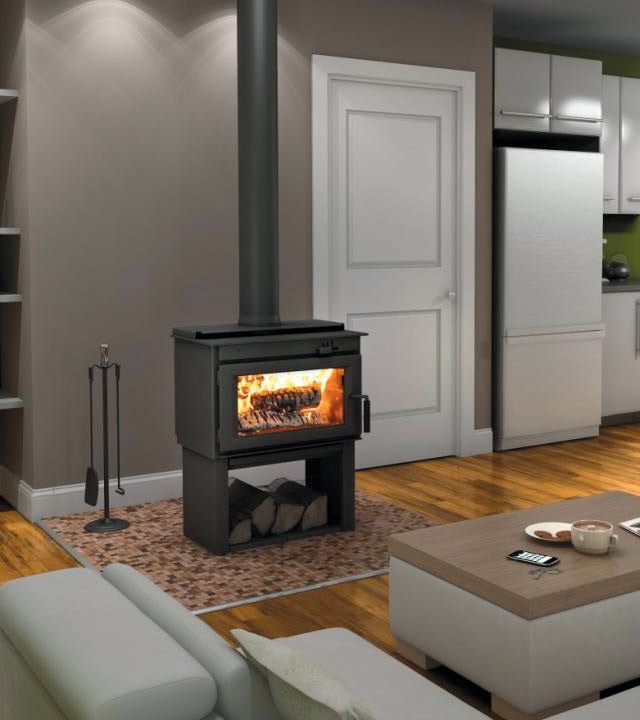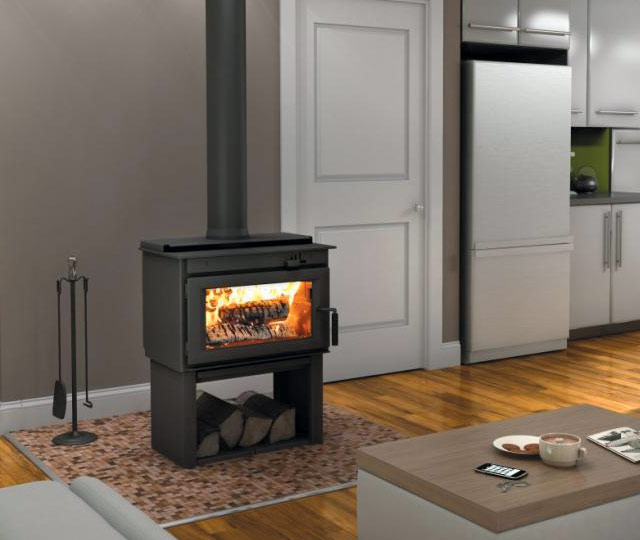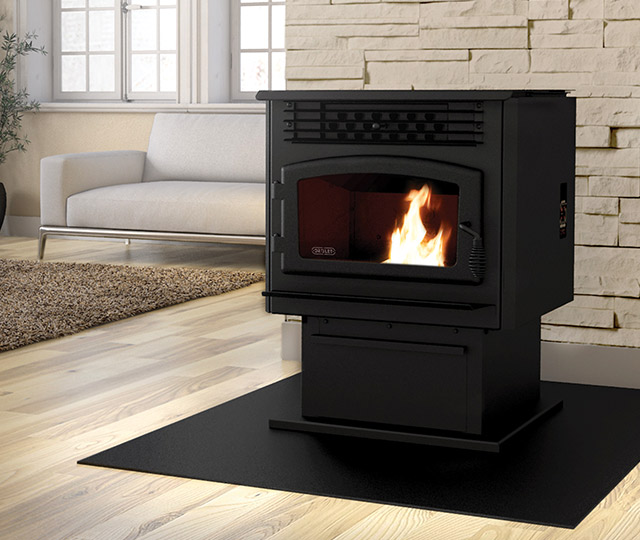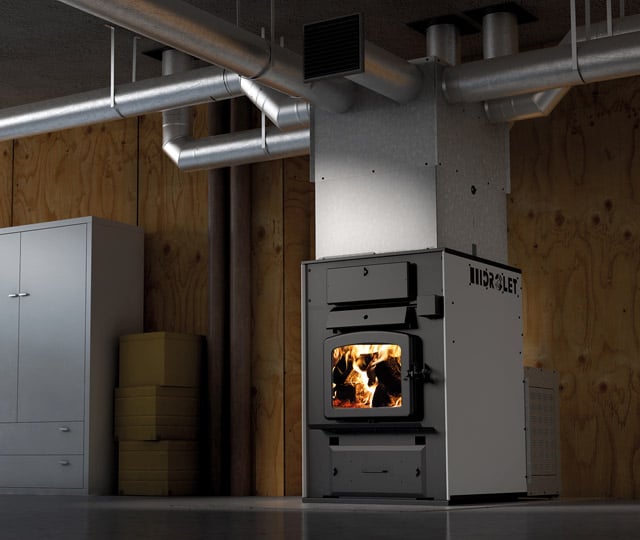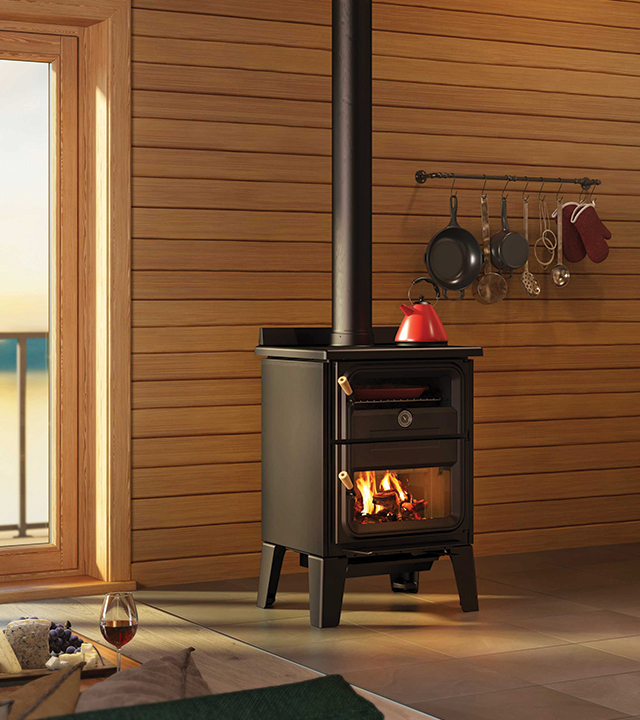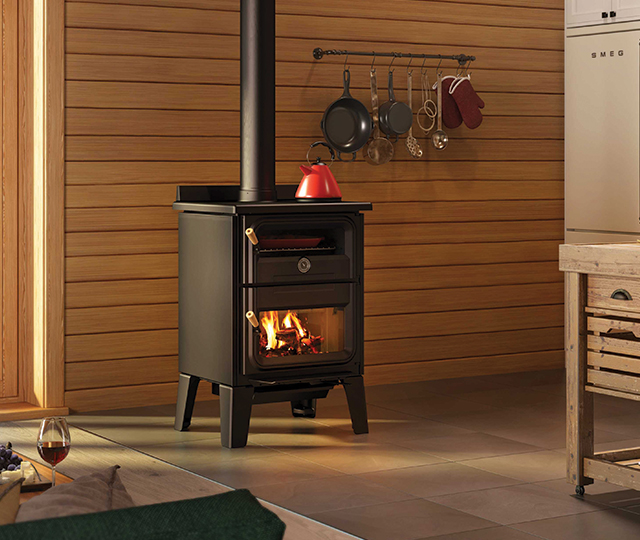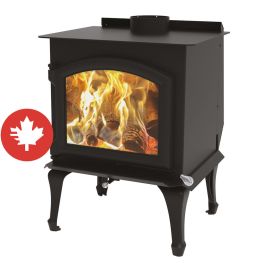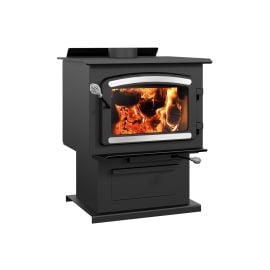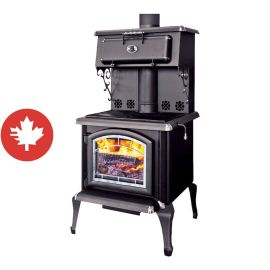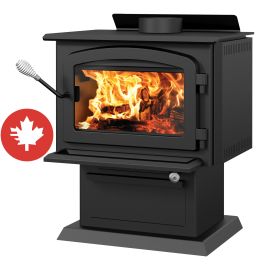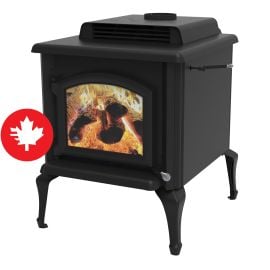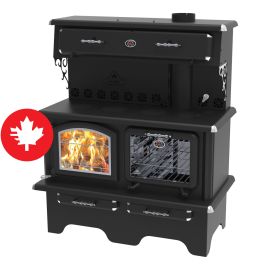Wood stove offers a timeless appeal, connecting us to nature and providing a cozy atmosphere. Thanks to advancements in technology, wood-burning appliances are now cleaner and more efficient than ever before. Whether as a supplementary heat source or to create ambiance, wood stoves, pellet stoves, and wood furnaces emit a cozy warmth that quickly transforms a home into a welcoming space. Explore this article to compare the pros and cons of each appliance.
Wood stove
Wood stoves offer an unmatched ambiance and warmth, which is why they remain so popular. However, older models released a significant amount of particulates into the air, polluting the environment.
To reduce environmental impacts, many wood stoves are now certified by the Environmental Protection Agency (EPA) or the Canadian Standards Association (CSA). This certification guarantees a combustion quality of less than 7.5 g/h of fine particles. This is a significant improvement considering that older wood-burning appliances could release between 70 and 100 g/h. Certified appliances require less wood and produce less smoke and ash than uncertified ones, making them an excellent choice for both health and the environment!
Also, check with your municipality for any restrictions regarding the amount of particle emissions allowed in the atmosphere.
Advantages
The crackling of a wood fire and the comforting scent of burning wood create a warm and nostalgic ambiance. Wood stoves are also incredibly efficient, providing quick and supplemental heat.
Inconvenients
Traditional wood stoves are fueled by logs, which is part of their charm. However, this fuel source requires a significant amount of storage space and handling. In addition to being difficult to light at times, the appliance can lead to heat loss when not in use. To minimize the risk of overheating and fire, you must clean it regularly and schedule annual maintenance with a specialist.
How to choose the right wood stove size
To select the right size wood stove, estimate the number of square feet to be heated. A space of 1,500 square feet can be heated by an appliance with a combustion chamber of 1.5 to 2 cubic feet and a heat output of approximately 50,000 BTU/h. An area of approximately 2,500 square feet, on the other hand, will require a stove of 2 to 2.5 cubic feet and a heat output of 70,000 BTU/h .
Pellet stove
Pellet stoves have gained significant popularity due to their ability to provide even heat for extended periods, making them a very attractive supplementary heating option. Fueled by wood pellets, which are typically made from compressed sawdust, they represent an eco-friendly choice.
Advantages
Many people appreciate this type of appliance due to its ease of use, since pellets are sold in bags and are easily stored. As a pellet stove can be controlled by a thermostat, it is possible to adjust and maintain a constant degree of heat. Furthermore, automatic feed models can offer combustion lasting up to 20 hours.
In addition, installing this type of appliance does not require a vertical venting system or chimney; a horizontal vent works perfectly well. And since pellets release only low emissions, it is an entirely ecological solution.
Inconvenients
In addition to providing less atmosphere than a wood stove, a pellet stove cannot be used during a power outage, unless it is connected to a generator. Its fuel delivery, air circulation, and combustion gas evacuation systems are all electric.
Furthermore, the installation of a pellet stove must comply with the manufacturer's recommendations. The appliance and its components must also be cleaned regularly, including the glass, the heat exchanger, and the mechanical parts. Diligent maintenance will ensure optimal performance and durability. Moreover, the quality and quantity of pellets burned will have an impact on the maintenance frequency.
Did you know? Some pellet stoves can now be controlled remotely using a home Wi-Fi connection. The electronic board integrated into your heating appliance allows you to control the start-up, duration of use, temperature, and fan speed from an app downloaded to your mobile phone.
Choosing a wood or pellet stove?
| Factors to consider | Wood Stove | Pellet Stove |
| Installation | Easy | Moderate |
| Costs | High | Moderate |
| Efficiency | Average | High |
| Power supply | Firewood | Pellets |
| Heat type | Variable | Constant |
| Temperature setting option | No | Yes |
| Particle emission | Low | Very low |
| Maintenance | High | Low |
| Factors to consider | Wood Stove | Pellet Stove |
|---|---|---|
| Installation | Easy | Moderate |
| Costs | High | Moderate |
| Efficiency | Average | High |
| Power supply | Firewood | Pellets |
| Heat type | Variable | Constant |
| Temperature setting option | No | Yes |
| Particle emission | Low | Very low |
| Maintenance | High | Low |
Wood furnace
How would you like to heat your property in dual-energy mode? A wood-fired furnace is a highly attractive solution. Manually supplied with wood, it features an air exchanger that recovers outside air, heats it with flames, then blows it through a fan into a circuit that supplies all the rooms in the house. A water preheating system can also be added to maximize overall efficiency .
Advantages
The wood furnace is ideal for homes with several divisions. Since the air is blown through a system of ducts, natural circulation doesn't have to be optimal. The heat released by the central system is therefore consistent and comfortable. Both clean and efficient, this type of wood heating is worth considering for its ecological, economic and ease-of-use reasons, especially if you live in an area where there is a large supply of quality firewood.
Inconvenients
As with the previous solutions, it's a good idea to keep an eye on EPA certification to ensure that you're buying the most environmentally friendly appliance possible. In terms of performance, your wood-burning furnace may exhibit some variations in heat output, depending on its location, building insulation, chimney draw capacity, outside temperature, humidity levels and the type of firewood used . Finally, the ventilation system can sometimes be noisy compared to other options.
Wood-burning cookstove
The big wood-burning cookstoves of yesteryear are making a comeback in our homes - especially in cottages! In addition to creating an ambience reminiscent of our grandparents' time, wood-fired stoves warm a home while offering the possibility of concocting comforting meals. Compact and versatile, the new models feature an air control that regulates combustion and adjusts cooking temperature.
Need help in choosing a wood stove?
Come into our store to talk to one of our advisors and discover Drolet and J.A. Roby wood-burning appliances. In addition to answering your questions, our team of specialists will guide you towards the solution best suited to your needs.
Once you've made your choice, don't forget to install a smoke and carbon monoxide detector to ensure the safety of all occupants.
Frequently asked questions: Choosing a wood stove
Last update: September 2025
